Heart Rate Variability
The brain is constantly processing information and sometimes this can be overwhelming. Heart rate variability or HRV, and Heart coherence training can be of use to train yourself.
It is normal for your body to react to all kinds of circumstances , including stressful ones. If you are attacked by a wild animal, it is very convenient to run away as fast as you can, and you will. Once the dangerous animal has disappeared and a stress response is still active, you become exhausted. Your immune system in particular becomes seriously distorted. To reduce the effects of stress we will teach you stress management, and this will enable you to be more balanced. It may be necessary to detect stress physically in order to let the body respond accordingly. The resting heart rate of a stressed person is usually higher than that of a relaxed person. For a healthy adult the resting heart rate is about 60 beats per minute. A resting heart rate of 93 when you are in a sitting position, is more like the heart rate during normal walking. If you do go for a walk you’ll probably feel better because your heart rate matches your physical willingness to come into action. Head, heart, and hands are in line again, and this is the first step to wellbeing.
To switch back to a peaceful state of mind and body is very important. Your body becomes more relaxed, your heartbeat a bit lower and emotions more in balance. We practice techniques with you, such as heart coherence or the energy control method, and are able to use measuring equipment to visualize your progress. Only if you feel safe you are able to fully relax, this is very personal, therefore many ways exist to relax. We will find the most suitable ways for you.
- Breathing exercises: breathe in, breathe out slowly and pause.
- Progressive relaxation according to Jacobson, stress and relaxation examined.
- Hold Relax method – specific exercises to relax muscles.
- Guided visualization of your body and cells, studies by Dr. Carl Simonton.
- Imagination exercises for situations that suit you and where you can relax in. You imagine things like images, music, heat, cold, vibrations and so on.
- Focus on your body with thoughts and especially feelings, this can really provide a lot of insight. This is different from Mindfulness.
- What has your body got to tell you? Listen to your body. What does your body indicate?
- We discuss the important norms and values from your (family) history related to stress or pressure. If the best entry for improvement can be found at a psychologist we can refer you to one.
